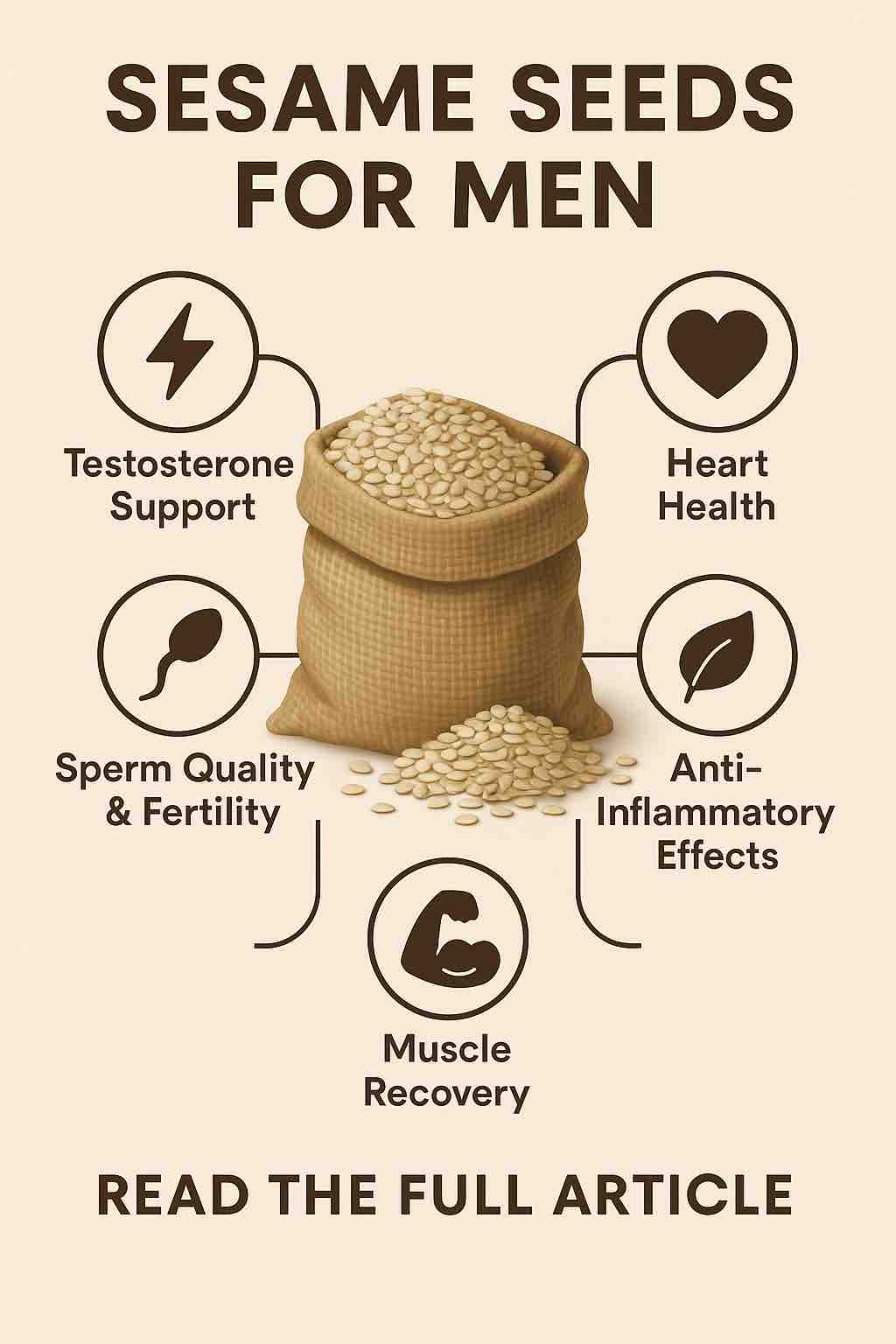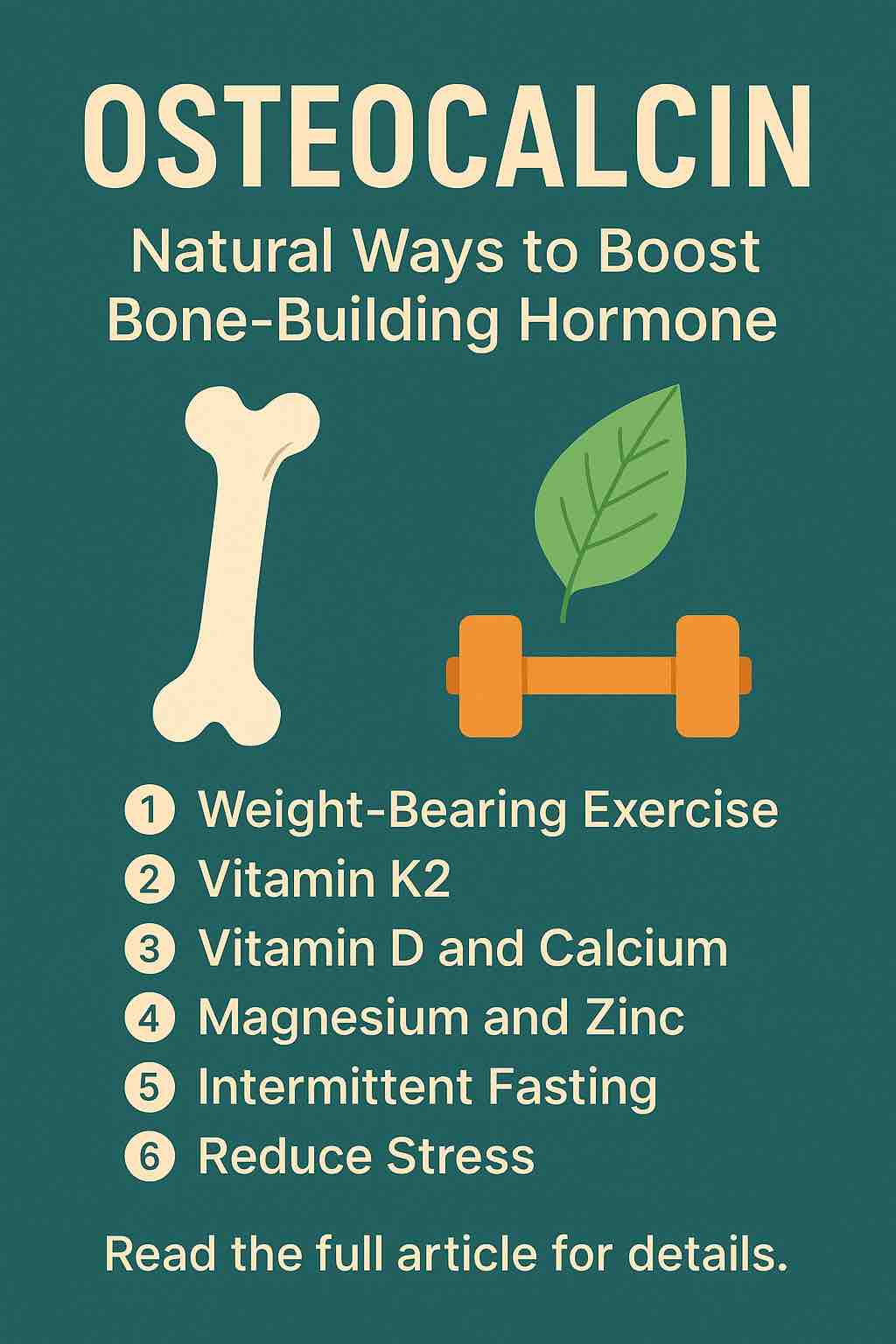
If you think of sesame seeds as just a garnish on burger buns or a sushi roll topping, think again. These tiny seeds pack an impressive nutritional punch—and for men, the benefits go way beyond basic nutrition. From boosting testosterone levels to improving heart health and fertility, sesame seeds may be one of the most underrated superfoods in a man’s diet.
In this post, we’ll explore the science-backed health benefits of sesame seeds for men, dive into how they work in your body, and share practical tips to get more of them into your meals.
🧬 Nutritional Snapshot: What’s Inside a Sesame Seed?
Let’s start with what makes sesame seeds special.
1 tablespoon (9g) of whole sesame seeds contains:
- Protein: 1.6g
- Fats: 4g (mostly healthy unsaturated fats)
- Fiber: 1.1g
- Zinc: 9% of RDA
- Magnesium: 8% of RDA
- Calcium: 9% of RDA
- Iron, Phosphorus, Copper, Selenium, Vitamin B1, and Lignans (sesamin & sesamol)
It’s not just about individual nutrients. These components work together synergistically to offer unique physiological benefits—especially for men.
🔥 1. Testosterone Boosting Potential
Low testosterone levels can lead to fatigue, reduced muscle mass, mood swings, and decreased libido in men. While lifestyle, sleep, and exercise play a role, nutrition is critical—and sesame seeds shine here.
How Sesame Seeds Help:
- Zinc: Essential for testosterone production. Zinc deficiency is directly linked with hypogonadism (low testosterone).
- Magnesium: Supports bioactive testosterone, especially in men who exercise.
- Lignans (Sesamin & Sesamol): Modulate enzymes involved in hormone metabolism.
Study Insight: A study published in Nutrition (2009) found that diets high in magnesium and zinc improved testosterone profiles in men, particularly those who were physically active.
Bottom Line: Just a tablespoon or two of sesame seeds daily could subtly but significantly support your hormone health.
🍇 2. Fertility and Sperm Health
Sperm quality has declined globally in recent decades. Environmental toxins, poor diet, and oxidative stress are partly to blame. But the antioxidants in sesame seeds may offer a natural counter.
What They Do:
- Vitamin E & Selenium: Protect sperm from oxidative damage.
- Zinc & Folate: Improve sperm count and motility.
- Polyunsaturated fats: Support sperm membrane integrity and flexibility.
Clinical Study: In a 2013 trial, men with low sperm counts were given 0.5g/kg body weight of sesame powder daily for 3 months. The result? Significant improvement in sperm count and motility.
This makes sesame seeds a simple, food-based intervention for men facing fertility issues.
❤️ 3. Cardiovascular & Metabolic Health
Men are at greater risk of heart disease earlier in life compared to women. The natural compounds in sesame seeds can support cardiovascular function and reduce inflammation.
How:
- Sesamin and sesamol: Potent antioxidants that reduce LDL oxidation.
- Phytosterols: Compete with cholesterol absorption in the gut.
- Omega-6 fats: When balanced, these help manage triglyceride levels.
Evidence: A study in the Iranian Journal of Pharmaceutical Research found that regular sesame consumption reduced total cholesterol, LDL, and improved antioxidant capacity in hyperlipidemic subjects.
🧠 4. Mental Clarity and Anti-Stress Effects
Chronic stress affects testosterone, sleep, and overall energy. Sesame seeds help calm the nervous system thanks to their magnesium and B-vitamin content.
- Magnesium: Plays a key role in the body’s stress response and cortisol regulation.
- B1 (Thiamine): Important for cognitive function and mood stabilization.
Pro tip: Pair sesame seeds with vitamin C-rich foods (like lemon or bell peppers) to enhance mineral absorption and antioxidant synergy.
💪 5. Muscle Recovery and Performance
For active men, muscle soreness, inflammation, and oxidative stress can stall progress. Here’s where sesame’s anti-inflammatory profile becomes even more valuable.
- High-quality plant protein: 20% of sesame’s weight is protein.
- Rich in minerals: Phosphorus, calcium, and magnesium support muscle contractions and bone strength.
- Fatty acids: Aid recovery and energy metabolism.
While not a complete protein, sesame combined with legumes or whole grains creates an excellent protein source.
🧠 Summary: Key Benefits of Sesame Seeds for Males
| Benefit | Details | Supporting Evidence |
|---|---|---|
| Testosterone support | Zinc content supports testosterone production. | Clinical studies link zinc with testosterone levels. |
| Sperm quality & fertility | Rich in antioxidants and micronutrients like selenium and vitamin E. | Studies show improved sperm motility & count. |
| Heart health | High in lignans and healthy fats (esp. sesamin & sesamol). | Human and animal studies show improved lipid profiles. |
| Anti-inflammatory & antioxidant | Reduces oxidative stress and inflammation. | Good antioxidant profile: sesamin, sesamol, vitamin E |
| Muscle function & recovery | Magnesium and protein content may support muscle metabolism. | Relevant for active/lifting males. |
| Prostate health | Zinc and antioxidants may support long-term prostate health. | Mechanistic support; limited direct clinical studies. |
| Libido & sexual health | Traditional use in Ayurvedic and Chinese medicine as aphrodisiac. | Mostly anecdotal; more scientific research needed. |
🍽️ Practical Tips: How to Eat Sesame Seeds Daily
You don’t need to overhaul your diet. Here are easy, flavorful ways to incorporate sesame:
🥄 Sprinkle & Snack
- Add roasted seeds to salads, yogurt, oats, or rice bowls.
- Mix with honey and nuts for homemade energy bars.
🥣 Tahini Time
- Use tahini (sesame paste) in dressings, hummus, or drizzle over roasted veggies.
🍜 Asian-Inspired
- Toast sesame seeds and toss them into noodle bowls, stir-fries, or soups.
🥄 Morning Blend
- Add 1 tsp of ground sesame seeds into your smoothies or protein shakes.
Pro tip: Grinding sesame seeds helps improve nutrient absorption—especially for zinc and calcium.
⚠️ A Few Cautions
While sesame seeds are incredibly beneficial, keep these in mind:
- Allergies: Sesame allergy is one of the more common seed allergies.
- Calories: Dense in energy—moderation is key if you’re managing weight.
- Oxalates: Those prone to kidney stones may want to balance intake with hydration and citrate-rich foods.
🔚 Final Thoughts: Small Seeds, Big Gains
Men’s health is often framed in terms of gym routines, testosterone boosters, or supplements—but don’t underestimate the power of food. Sesame seeds are an ancient superfood with modern science behind them, supporting everything from reproductive health to heart and muscle performance.
Whether you’re an athlete, a busy professional, or someone navigating the effects of aging, adding a tablespoon of sesame a day might just be the low-effort, high-reward habit you’re missing.
💬 Have You Tried Sesame Seeds Regularly?
Drop a comment below if you’ve added sesame seeds into your diet and noticed any changes—or if you want recipes to start! 👇
❓ FAQs: Sesame Seeds & Men’s Health
1. How much sesame seed should a man eat daily to see benefits?
Most benefits can be gained with 1–2 tablespoons (around 9–18 grams) of sesame seeds per day. This provides enough zinc, magnesium, and antioxidants to support hormone balance, heart health, and fertility over time.
2. Can sesame seeds really increase testosterone levels?
Indirectly, yes. Sesame seeds are rich in zinc and magnesium, two minerals essential for testosterone production. While they aren’t a testosterone “booster,” they help support a healthy endocrine system.
3. Are black sesame seeds better than white ones for men’s health?
Both are beneficial, but black sesame seeds are slightly higher in antioxidants and calcium. They’re often preferred in traditional medicine systems for boosting vitality and kidney health.
4. Do sesame seeds help with male fertility?
Yes. Sesame seeds have shown positive effects on sperm count and motility, thanks to their antioxidant content and essential fatty acids. One clinical study found improved semen quality after 3 months of supplementation.
5. How long does it take to notice effects from eating sesame seeds?
While nutrient benefits start immediately, visible effects like improved energy, libido, or sperm parameters typically show up after 6–12 weeks of consistent intake.
6. What’s the best way to consume sesame seeds for maximum benefit?
Grinding sesame seeds improves nutrient absorption. Also, roasting lightly can enhance flavor and bioavailability. Tahini (sesame paste) is also a very effective and versatile form.
7. Can sesame seeds improve sexual health and libido?
They may help indirectly by supporting hormone balance, reducing oxidative stress, and improving blood circulation—all of which contribute to better sexual function and stamina.
8. Are sesame seeds safe for daily consumption?
Yes, for most people. Just stick to moderate amounts (1–2 tablespoons/day) and watch for any allergic reactions. Those with oxalate sensitivity (kidney stone risk) should limit intake.
9. Can sesame seeds help men who work out or lift weights?
Absolutely. They support muscle recovery, reduce inflammation, and provide magnesium and protein—essential for performance and strength.
10. Do sesame seeds affect prostate health?
They may. Sesame seeds contain zinc and antioxidants, which are known to support prostate function and potentially lower inflammation associated with prostate issues over time.










